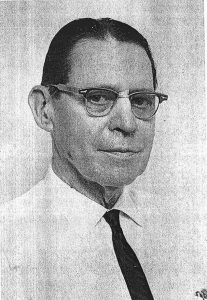Raymond McCarthy
 Raymond McCarthy (1901-1964) was perhaps the first major figure to rise to prominence from within the alcohol studies field itself. He was also the pioneer of modern alcohol education.
Raymond McCarthy (1901-1964) was perhaps the first major figure to rise to prominence from within the alcohol studies field itself. He was also the pioneer of modern alcohol education.
McCarthy was associated with the Center of Alcohol Studies from 1944 until his death in 1964 in various capacities, including director of the Yale Plan Clinics, director of the Summer School of Alcohol Studies, and professor of education.
-
Raymond Gerald McCarthy was born in Brockton, Massachusetts on April 30, 1901. He studied social work at Boston College and went on to earn a master’s degree in education from Harvard University in 1939. His early career was spent as a teacher and then superintendent of the Kingston, Massachusetts public schools. McCarthy became interested in alcohol problems largely through the writings of Richard R. Peabody and attended the first Summer School of Alcohol Studies at Yale University in 1943. There he met E. M. Jellinek, the director of the School, who was so impressed with McCarthy that he made him the first staff member of the newly-formed Yale Plan Clinics. McCarthy worked in the clinics for the next several years and ultimately became executive director. He was a key scholar and advocate for group-therapeutic treatments to alcoholism.
McCarthy was also well-known in his capacity as an educator. From 1948 until 1961, he was associate director of the Summer School of Alcohol Studies, and from 1962 until his death he was director of the School, during which time he substantially revised the curriculum to stress graduate-level training. He was also a professor of education at the Center, both at Yale and at Rutgers, where he was instrumental in developing public health proposals and other educational materials. McCarthy held leadership positions in a myriad of organizations, including the alcoholism division of the departments of public health of Connecticut, Massachusetts, and New York, the North American Association of Alcoholism Programs, the Association for the Advancement of Instruction about Alcohol and Narcotics, and the American Public Health Association.
-
His early career was spent as a teacher and then superintendent of the Kingston, Massachusetts public schools. McCarthy became interested in alcohol problems largely through the writings of Richard R. Peabody and attended the first Summer School of Alcohol Studies at Yale University in 1943.
- Born in Brockton, Massachusetts on April 30, 1901
- He studied social work at Boston College.
- Earn a master’s degree in education from Harvard University in 1939.
- Attended the first Summer School of Alcohol Studies at Yale University in 1943.
- From 1948 until 1961, he was associate director of the Summer School of Alcohol Studies for both Rutgers and Yale.
- From 1962 until his death he was director of the School, during which time he substantially revised the curriculum to stress graduate-level training
-
Selected list of publications
McCarthy, R. G. (1946). [Review of the book The glass crutch: The biographical novel of William Wynn Wister, by J. Bishop]. Quarterly Journal of Studies on Alcohol, 7, 181–183.
McCarthy, R. G., & Douglass, E. M. (1948). Instruction on alcohol problems in the public schools. Quarterly Journal of Studies on Alcohol, 8, 609–635.
McCarthy, R. G. (1949). Group therapy in alcoholism. Transcriptions of a series of sessions recorded in an outpatient clinic. I. Introduction and first two sessions. Quarterly Journal of Studies on Alcohol, 10, 63–108.
McCarthy, R. G. (1949). Group therapy in alcoholism. Transcriptions of a series of sessions recorded in an outpatient clinic. II. Third session. Quarterly Journal of Studies on Alcohol, 10, 217–250.
McCarthy, R. G. (1949). Group therapy in alcoholism. Transcriptions of a series of sessions recorded in an outpatient clinic. III. Fourth session. Quarterly Journal of Studies on Alcohol, 10, 479–500.
McCarthy, R. G., & Douglass, E. M. (1950). A manual of facts and fancies about alcohol [Pamphlet]. New Haven, CT: Publications Division, Yale Center of Alcohol Studies.
McCarthy, R. G., Bacon, S. D., Henderson, R. M., Lolli, G., & Straus, R. (1950). Alcoholism in Los Angeles County: Problems and recommendations. New Haven, CT: Publications Division, Yale Center of Alcohol Studies.
McCarthy, R. G. (1950). Group therapy in alcoholism. Transcriptions of a series of sessions recorded in an outpatient clinic. IV. Fifth session. Quarterly Journal of Studies on Alcohol, 11, 119–140.
McCarthy, R. G. (1950). Group therapy in alcoholism. Transcriptions of a series of sessions recorded in an outpatient clinic. V. Sixth session. Quarterly Journal of Studies on Alcohol, 11, 309–330.
McCarthy, R. G. (1950). Group therapy in alcoholism. Transcriptions of a series of sessions recorded in an outpatient clinic. VI. Seventh session. Quarterly Journal of Studies on Alcohol, 11, 630–653.
McCarthy, R. G. (1950). Public health approach to the control of alcoholism. American Journal of Public Health, 40, 1412–1417. doi:10.2105/AJPH.40.11.1412
Lolli, G., Serianni, E., Banissoni, F., Golder, G., Lisansky, E., Mariani, A., … Toner, M. (1951). A study of the relations of eating and drinking to the physiological and psychological behavior of a group of Italians and Italian-Americans [Pamphlet]. New Haven, CT: Publications Division, Yale Center of Alcohol Studies.
McCarthy, R. G., & Douglass, E. M. (1959). Prohibition and repeal. In R. G. McCarthy (Ed.), Drinking and intoxication: Selected readings in social attitudes and controls (pp. 369–382). New Haven, CT: Publications Division, Yale Center of Alcohol Studies.
McCarthy, R. G., & Douglass, E. M. (1959). Systems of legal control. In R. G. McCarthy (Ed.), Drinking and intoxication: Selected readings in social attitudes and controls (pp. 429–433). New Haven, CT: Publications Division, Yale Center of Alcohol Studies.
McCarthy, R. G. (1964). Counseling in alcoholism. In E. Harms & P. Schreiber (Eds.), Handbook of counseling techniques (pp. 420–432). New York: Pergamon.
McCarthy, R. G. (Ed.). (1964). Alcohol education for classroom and community: A source book for educators. New York: McGraw-Hill.